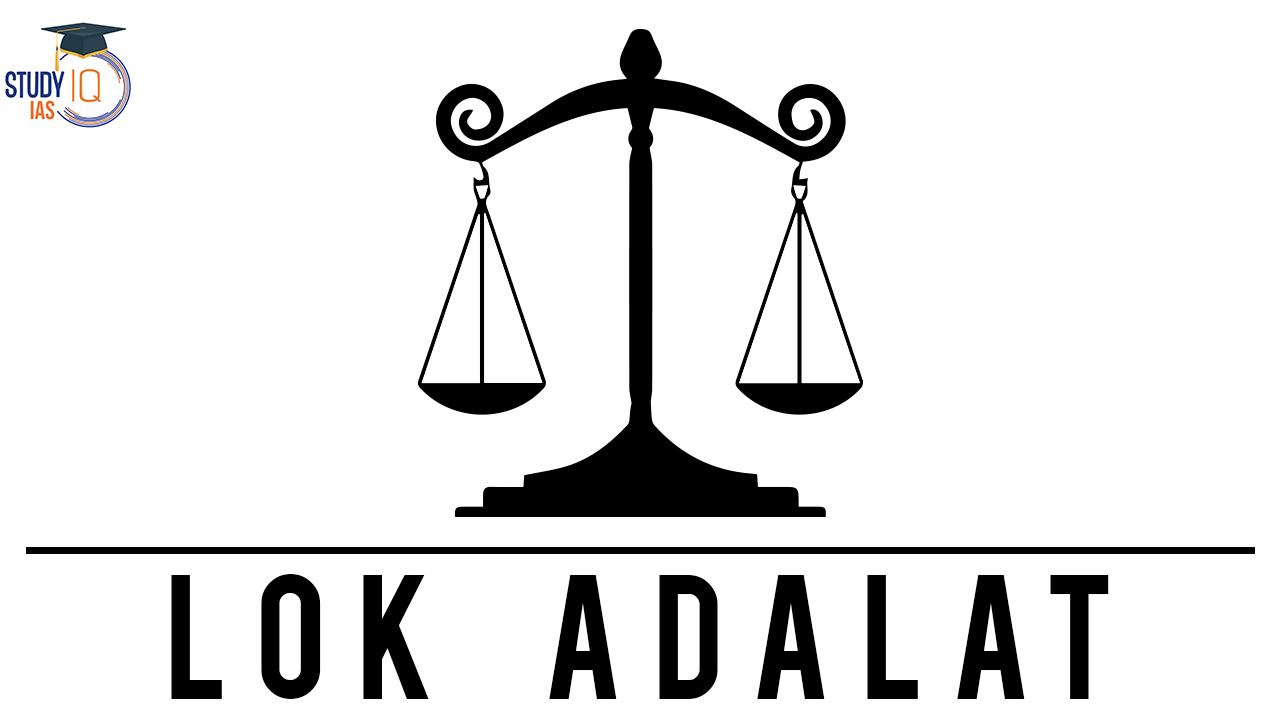Table of Contents
Lok Adalat
The commitment given in the preamble of the Indian Constitution to ensure the social, economic, and political justice of every Indian citizen is to be carried out by the Lok Adalat. The Constitution’s Article 39A ensures that those who are less fortunate or weaker in society will receive free legal assistance and supports justice based on fair access. The Constitution’s Articles 14 and 22(1) further require the State to ensure equality before the law. Lok Adalats, which is covered in this article, is covered in the Indian Polity and Governance of UPSC Syllabus. Students can also go for UPSC Mock Test to get more accuracy in their preparations.
Understand the meaning of Lok Adalat
The Lok Adalat is an ancient sort of adjudicating system that was used in ancient India; according to the Supreme Court, its legality has not been revoked in current times either. Lok Adalat is an acronym for “People’s Court.” Gandhian ideals serve as the foundation of this system.
It is a part of the Alternative Dispute Resolution (ADR) system that offers the general people informal, minimum, and quick justice. The first Lok Adalat camp in Gujarat took place in 1982 as a voluntary and conciliation-based institution without any formal backing for its decisions. The Legal Service Authority Act of 1987 granted the Lok Adalat statutory standing in response to its rising popularity.
Lok Adalat Jurisdiction
Any issue that is currently proceeding in court and any topic that is subject to a court’s jurisdiction but is not presented before that court are examples of areas in which a Lok Adalat has the authority to decide and reach a resolution between the parties to a dispute.
If both sides in a case agree to settle their differences in Lok Adalats, one party can ask the court to send the case there. If the court agrees that the case is suitable for Lok Adalat, it will refer it for resolution. The organization running the Lok Adalats can also handle disputes before they go to court.
Lok Adalats can address various issues, including family disputes, certain criminal cases, land issues, labor disputes, and bank recovery cases. However, they cannot deal with crimes that cannot be settled through legal agreements.
Also Read: Subordinate Courts
Lok Adalat Compositions
Lok Adalats can be organized at any time and place decided by the State or District Legal Services Authority, or the Supreme Court, the High Court, or local committees. Each Lok Adalat will include a specific number of active or retired judges and local community members as decided by the hosting organization.
Members
Members of the Lok Adalats are the people who decide the cases in the Lok Adalats. They solely act as statutory mediators. They play no judicial function.
Statutory
Lok Adalats have been accorded legislative status by the Legal Services Authorities Act of 1987.
Final award
The Lok Adalat decision is final and enforceable for all parties under the Legal Services Authorities Act of 1987 and is treated as the judgement of a civil court.
No appeal
There is no provision for an appeal of the Lok Adalat ruling. Despite the lack of an appeals process, the parties are allowed to start a lawsuit if they are not happy with the Lok Adalat’s decision.
No fee
When a matter is brought before a Lok Adalat, there is no court fee due. The court money initially paid in the court on the petition is also given back to the parties if a legal dispute that is unresolved is referred to the Lok Adalat and resolved subsequently.
Amicable Resolutions
The Lok Adalat will not resolve the aforementioned dispute on its own initiative; rather, it will be resolved based on a compromise reached by the parties. The participants will support the parties’ efforts to amicably resolve their conflict in a sovereign and unbiased manner.
Also Read: Gram Nyayalayas
Lok Adalat Types
National Lok Adalat
Lok adalats are held throughout the nation on a single day, with national lok adalats occurring at regular intervals. Every month since 2015, a national Lok Adalat has been held on a certain topic.
Permanent Lok Adalat
In order to allow for the creation of Permanent Lok Adalats to deal with matters concerning public utility services like transit, telegraph, etc., the Legal Services Authorities Act, 1987 was revised in 2002. Two other individuals with sufficient experience in public utility services, as well as a district judge or additional district judge who is or has been a district judge or has held a judicial post higher in rank than that of the district judge, will serve as its chairpersons.
Any circumstance involving an offence that is not punishable by law is outside the scope of its jurisdiction. The decisions of the Permanent Lok Adalat are final and enforceable against all parties.
Mobile Lok Adalat
Additionally, mobile Lok Adalats are organised across the nation. In order to facilitate the process of settling disputes, it transfers from one location to another.
Lok Adalat Importance
In taluka and district courts, three to five year old cases make up 16.9% of all cases. the National Judicial Data Grid as a source Over 20.4% of all cases in high courts are older than 10 years, with 17% being older than 10 years.
Over 57 lakh cases are waiting before various High Courts, 66,000 cases are pending before the SC, and more than 3 crore cases are pending before various subordinate and district courts. Due to the fact that Lok Adalats are a party-driven process that enables them to reach an agreeable settlement, litigants are compelled to participate in them.
Lok Adalat Advantages
Lok Adalats have several advantages that make them more efficient than regular courts, leading to quicker dispute resolutions:
Procedural Flexibility
Lok Adalats have flexible procedures, allowing parties to communicate directly through their lawyers. This flexibility helps in finding mutually acceptable solutions.
No Court Fees
There are no fees to file cases in Lok Adalats. If a case is moved from a regular court and settled, the original court fees are refunded.
Final and Binding Decisions
Decisions made by Lok Adalats are final and cannot be appealed. This means cases are resolved quickly without further disputes.
Maintaining Good Relationships
Lok Adalats focus on compromise, acting as conciliators rather than judges. This approach helps parties reach agreements while preserving their relationships, making it a healthy way to resolve conflicts.
Lok Adalat Concern Associated
The bulk of the time, wealthy parties like banks, insurance firms, and utility boards are pitted against the plaintiffs in court. The impoverished are typically forced to make sacrifices and frequently have no choice but to do so.
Given that compromise is at the core of its philosophy, there is fear that in the effort to resolve cases quickly, the concept of justice may be compromised. In State of Punjab v. Jalour Singh (2008), it was decided that a Lok Adalat’s sole purpose is to mediate disputes and that it has no judicial or adjudicative powers.
Lok Adalats and Access to Justice: A Explanation
What is “Access to Justice”?
“Access to justice” means that everyone has the right to use legal processes to seek help, regardless of their social or economic status. It ensures fair treatment within the legal system. It’s important to differentiate between “access” to justice (the opportunity to seek help) and access to “justice” (whether fair outcomes are achieved).
Role of Lok Adalats in Providing “Access” to Justice
Since 1982, Lok Adalats have helped poor people access justice in India, where over 33 million cases are pending. In 2017 alone, they resolved over 5 million cases, averaging about 4,000 cases a day. They are crucial for reducing the judicial backlog. Importantly, Lok Adalats don’t charge fees, making them a more affordable option for those in need.
Role of Lok Adalats in Providing Access to “Justice”
However, just having access to a legal process isn’t enough for true justice. Factors like financial status, fair treatment during trials, and pressure in legal proceedings matter too. Often, parties settle in Lok Adalats not because they want to, but because they can’t afford to continue litigation. This raises concerns about whether Lok Adalats truly provide fair access to justice for the poor.
Conclusion
Lok Adalats are an important part of the Indian legal system, helping poor and marginalized people access justice. They have made legal aid more available, but there are still areas that need improvement to increase their effectiveness. While they help people access the legal system, it’s important to evaluate how well they provide real justice. In summary, there are ways to enhance Lok Adalats to better address the growing number of legal cases.
Lok Adalat UPSC
If people are willing and aware of its benefits, Lok Adalats can function at higher levels. In addition, permanent lok adalats need to be strengthened and given more creative uses so that they can serve as an additional form of litigation for those who cannot or shouldn’t use the courts. Students can read all the details related to UPSC by visiting the official website of StudyIQ UPSC Online Coaching.


 Admiralty (Jurisdiction and Settlement o...
Admiralty (Jurisdiction and Settlement o...
 Enemy Property Act in India, Background ...
Enemy Property Act in India, Background ...
 Phone-tapping in India, Legal Framework ...
Phone-tapping in India, Legal Framework ...





















